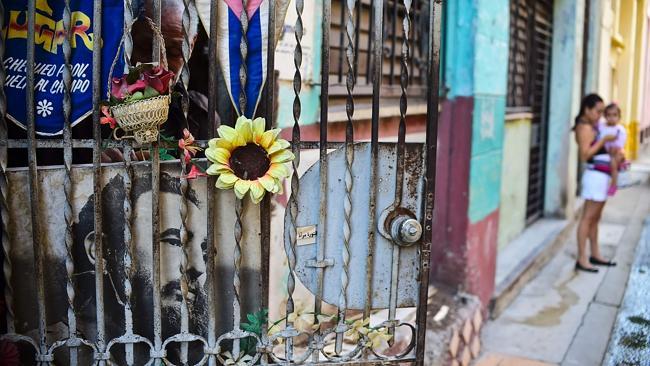China may fill Cuba void if US pulls back
Reversing Barack Obama’s outreach to Cuba would leave a big opening off the US coast for another great power: China

A reversal of Barack Obama’s outreach to Cuba, as threatened by president-elect Donald Trump this week, would leave a big opening off the US coast for another great military power. It likely wouldn’t be Havana’s traditional ally Russia, however, but China.
While Moscow’s economic and military role in Cuba is a shadow of its former self, Beijing has grown to become Cuba’s second-largest trading partner after Venezuela, which is now mired in a deep economic crisis.
In the past few years the US’s role in Cuba’s economy has grown quickly. Cuban-Americans now send an estimated $US3.4 billion ($4.5bn) a year in cash to relatives in Cuba — more than the country’s total annual exports, and up from $US1.92bn in 2010. Cubans also get $US3.5bn worth of merchandise such as shoes, clothing, TV or computers from their relatives.
But thanks to the US trade embargo the US remains a small player in two-way trade, accounting for only 1.54 per cent of Cuba’s imports. “If those links are severed because of a change in US policy towards Cuba, you’d be choking Cuba’s population, increasing risks of a huge migration wave,” said Emilio Moreno, head of the Miami-based Havana Consulting Group, a Cuba business consulting firm.
No world power, including China, would be able to make up for the loss of income from closer ties to the US, Mr Moreno said, adding that Cuba is in many ways more dependent on its erstwhile enemy and northern neighbour than at any time since the 1950s.
But China is making inroads. Trade between China and Cuba grew 13 per cent to $US1.1bn in the first two quarters of this year, after swelling 59 per cent in the previous year to reach $US2.2bn over all of 2015, according to China’s Ministry of Foreign Affairs.
China’s presence is noticeable on Cuban streets. New buses from China’s Zhengzhou Yutong group share space with rickety Flying Pigeon bicycles imported to replace cars in the “special period” after the Soviet Union disintegrated and oil subsidies evaporated. Yutong has built more than 90 per cent of Cuba’s city and tour buses, the company says. Since 2005 it exported more than 5800 buses to Cuba, as of last February.
China’s influence is also noticeable at ATMs — all of which accept cards from China UnionPay — and on Cuba’s nascent internet, much of which is built on equipment from China’s Huawei.
In telecommunications, Cuba is making decisions about bandwidth and spectrum standards and whether to adopt Asia Pacific or US norms, potentially affecting US tech companies.
“If it adopts the Asia Pacific standard, then Huawei will have a major advantage there in terms of selling equipment,” said Margaret Myers, a China in Latin America expert at the Inter-American Dialogue think tank in Washington.
Air China began carrying passengers from Beijing to Havana, by way of Montreal, three times a week in 2015. Travellers on those flights are expected to help support a planned $US460 million cluster of resorts being built on the island.
Chinese President Xi Jinping visited Cuba and met Fidel Castro in 2014. Chinese Premier Li Keqiang met Raul Castro during a two-day visit in September, signing co-operative agreements in sectors including finance, telecoms, environmental protection and production capacity.
Xu Shicheng, an expert on Cuba at the state-backed Chinese Academy of Social Sciences, said he was sceptical of Mr Trump’s threats to alter the terms of rapprochement between the US and Cuba. He said stable relations between the US and Cuba would help Chinese companies by providing a stable trade environment.
Cuba was the first Latin American country to establish diplomatic relations with China in 1960, but relations weren’t always friendly. Mao Zedong once accused Castro, who leaned more to the Soviet Union, of revisionism — a serious charge in Communist circles at the time. When China later reduced rice shipments to Cuba, Mr Castro accusing it of joining the US embargo.
Russia is more reluctant to boost economic ties with a country that cost the Soviets billions in subsidies. In 2014, Russian President Vladimir Putin wrote off $US29bn of the island’s $US32.2bn debt with Russia.
Still, in May Russia launched its largest investment project on the island since the Soviet era, beginning a $US1.4bn expansion of two local power plants. The Russian government lent Cuba the entire cost of the new plant units, which will be fed by crude oil and begin operation in 2022.
“This project doesn’t make much economic sense. It was done for political reasons” to maintain the Cuban government’s loyalty, said a manager at Russia’s state power company Inter RAO, which is in charge of the project.
Cuba had a unique status as a Cold War client of the Soviet Union, giving Moscow a strategic outpost just 145km from Florida. Marking Castro’s death last week, Mr Putin said, “The memory of him will live forever in the hearts of Russian citizens.”
For decades, Moscow maintained a crucial listening post at Lourdes, Cuba. That signals-intelligence facility was closed in 2001, and Russia denied reports in 2014 of a deal to reopen the base.
Beyond the superpower nostalgia, however, the direction of Russian-Cuban relations is less clear. The value of foreign trade between Russian and Cuba in the first three quarters of this year reached $US155.8m, up from $US115.2m for the same period in the previous year, according to Russia’s State Customs Committee. That is significantly lower than overall trade volumes between Havana and Beijing — or remittances from the US.



To join the conversation, please log in. Don't have an account? Register
Join the conversation, you are commenting as Logout